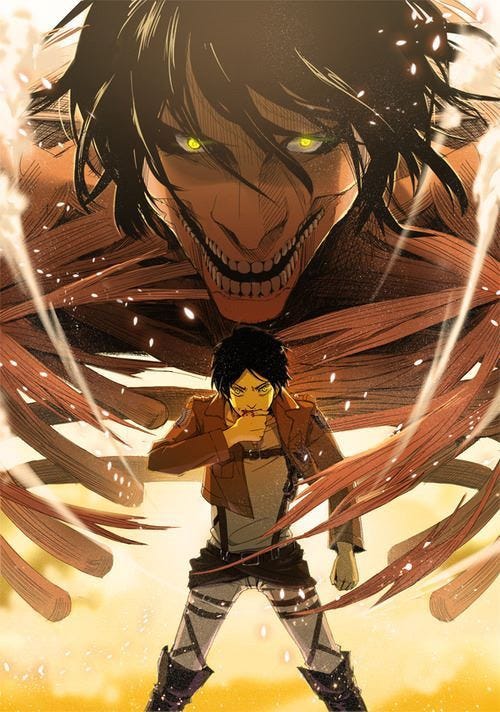The Transformative Protagonist — A retrospective look at Eren Yeager
Attack on Titan (aka Shingeki no Kyojin) first became a pop culture phenomenon in 2013 when its anime adaptation aired. But it wasn’t until recently that it established itself as one of the most celebrated works in anime history. AOT always had a cool premise, an intriguing setting, and solid action sequences going for it. Though for the most part, arguably, it was the brilliant adaptation from a pro anime director that transformed it from a story with shoddy manga artwork to an epic action show. And unlike most anime series, AOT did not squander its potential. Instead, it improved vastly over time and delivered on its initial promise. While the manga ending may leave ambivalent feelings for a lot of fans, there is no doubting the impact this story left across the world. The one element that particularly helped transform AOT into what it is today is its protagonist, Eren Yeager.
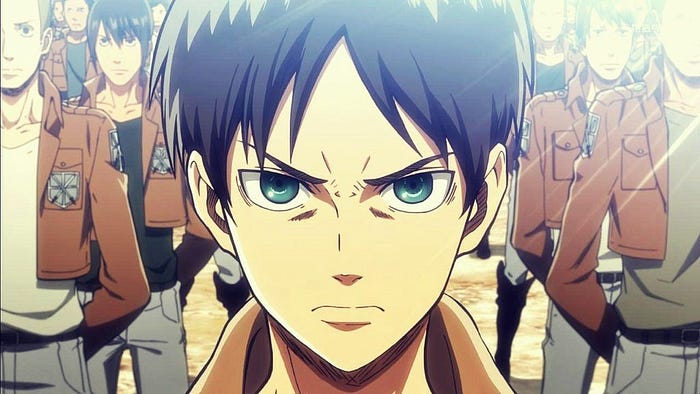
One of the most critical, as well as difficult, things to accomplish in speculative fiction is the character of the protagonist(s). A poorly written protagonist can ruin even a promising story. Conversely, a well-written protagonist can transform an otherwise ordinary story into a truly meaningful saga. For the purpose of my analysis, I uphold three criteria for a good fantasy protagonist: psychological coherence, a transformational point of view, and character development. Judged by these criteria, Eren Yeager emerges as one of the most well-crafted protagonists we’ve seen in fantasy. Let us see how.
Psychological Coherence
My definition of psychological coherence is this: does the protagonist’s character — intentions, motivations, choices, reactions, worldview — make sense in the world they inhabit? Is it coherent with their given backstory? The key to understanding characters is to understand the worlds they inhabit. Each fictional world contains its own psychological and material realities that, combined with a defined background, result in a specific kind of character. Can this character realistically exist in the setting laid out before us?
Well-written protagonists are the products of their worlds and their backgrounds define their actions. They may not be morally good or bad or even realistic by our world’s standards; their actions make perfect sense within their world and within the context of their backstories. A fine example of this would be Guts from the iconic manga, Berserk. His harsh and violent approach is perfectly sensible given the world he was born and raised in. On the other hand, the actions of poorly written protagonists do not sync with their world, and their motivations and choices are usually all over the place — Kirito from Sword Art Online is an example. Eren Yeager belongs to the former category.
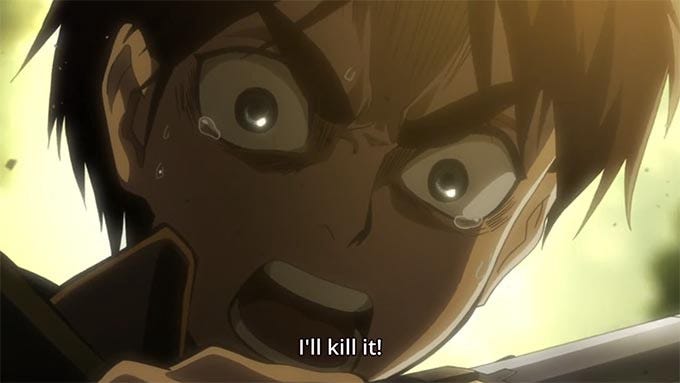
Eren is often characterized as angry and caustic, with an underlying violent streak. His primary source of motivation is a deep-rooted rage against forces that he believes have taken away his freedom, life, home, and family. This rage sharpens his focus and pushes him forward as he tries to achieve what he thinks is the solution to the problem that has defined his life. He is not an idealistic shonen protagonist, because his story dictates that he could never have been one. Consider his life journey so far: He is a kid living in a post-apocalyptic reality who watches his mother get eaten (yes, eaten) and his home destroyed by a horror that no one knows how to deal with. Tragedies beset him further as he faces betrayal after betrayal, and revelations about the world and his own family destroy his preconceptions. To top it off, he comes in possession of the very horror that he had built his entire worldview against.
With this contextual background, it is easy to see why Eren acts the way he does. His rage is what you would expect from a traumatized child raised in that reality. He is not an extraneous character inserted by the author to make a point. Neither is he a blank self-insert figure for the audience. Eren Yeager is a psychologically coherent character because even if you don’t empathize with him, you can see how his world created him and how he belongs to it.
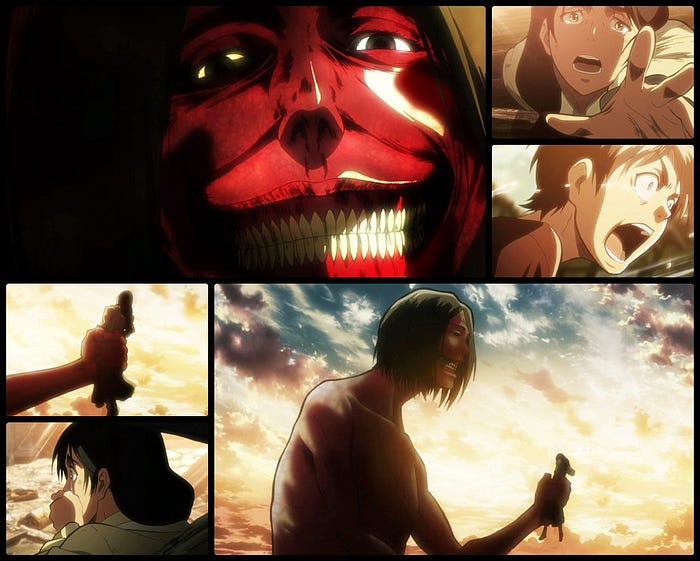
A Transformational Point of View
Let’s go back to another “good” fantasy protagonist: Guts. Among other things, he certainly stands out as an iconic fighter with a big sword who defeats powerful demons in an otherwise scary world. But what makes him a great protagonist is not just his ferocity. If that was the case, all it would take to make a story interesting would be a powerful hero. What makes Guts a good protagonist is his point of view. Good protagonists almost always offer a POV that no one else in their world can. The narrative that their journey encompasses makes the story what it is. Protagonists carry within themselves the essence of the story.
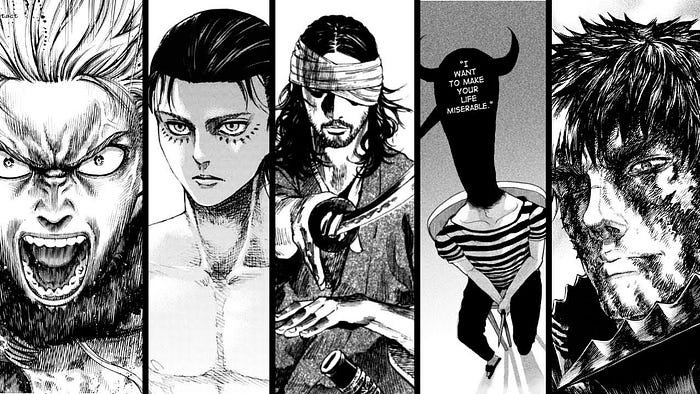
What would AOT be like if, say, Armin was the protagonist instead of Eren? There’s no denying that it would still be a good story: a genius tactician trying to figure the mysteries of the world. How would the story look like if Mikasa or Levi was the protagonist? I suppose a spectacular display of action with an overpowering main character would be exciting. AOT: Easy Mode, if you will. Now, what if Reinhard or Annie were the protagonists? A group of warriors travelling to the walls to steal the founding titan? Intriguing concept. But here’s the thing: all of these situations would completely change the essence of the story. They would be using AOT’s setting but it won’t be the AOT we have come to know and appreciate.
Without Eren as the protagonist, AOT won’t carry the same sense of frustration, helplessness, and more importantly, rage, that makes it a meaningful story. All of the feelings that Eren encompasses are passed onto the audience, who share them alongside him. His worldview provides us with the framework we need to consume this story. His trauma, his pain, his life story is what sets things into motion. If he was a secondary character, and we didn’t have access to his POV, we would miss out on a whole layer of complexity that AOT possesses as a story. The fact that he is the primary point of reference transforms the story into what it is. He carries the essence of AOT within him.
Can you imagine a story as fascinating as AOT without Eren as the POV character?

Character Development
“I’ll kill them all! I’ll wipe every one of them…off the face of this earth!”
— Eren Yeager, every ten minutes or so in the first half of AOT
Character development is integral to a good story. The person you see at the end of the story cannot be the person you met at the beginning. There has to be a tangible change, progress, transformation. When good protagonists are conceived, writers usually leave a space to develop within them. How that development shapes up depends on the story, of course. In Eren’s case, this development has been obvious. He is not the same character we saw in the first half of the story. He has evolved into someone else, someone intriguing and compelling.
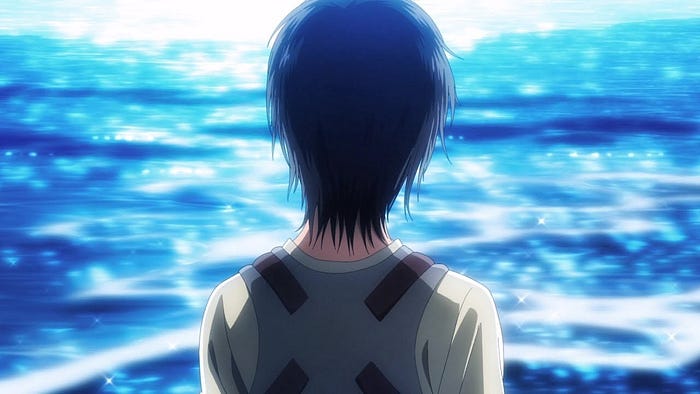
Yes, Eren did begin from a position of rage. Yes, he did have an obsession with annihilating the Titans. Yes, he did show signs of a black-and-white morality that makes it easier to deploy the violence that he does. But the narrative is set up such that his experiences lead him to evolve. First, as a soldier who comes face-to-face with the corruption of his human society and the unfairness of the system, and then, as a person who watches his entire conception of the world shatter. The second development, in particular, is thoroughly game-changing. Once the truth of the world is revealed in fullness, it forces Eren to re-evaluate his worldview. It completely changes Eren’s relationship with his arch-nemesis, the Titans.
Given that this is a shonen anime, some tend to think of Eren’s journey as a series of levelling up in power and skills. However, that is a simplistic reading. Sure, he learns many new skills and acquires some extraordinary powers. But each one of these comes with trauma and horror that grows deep inside him. It is not so much levelling up as it is a kind of peeling off of layers that covered him, a breaking of the shackles that bound him. Eventually, we see the “real” Eren emerge.
The person that Eren has become now is not necessarily “good” or “moral”. Development does not imply that the character becomes a better person at the end, but that the character has grown and adapted to their circumstances while retaining their coherence with their world and their journey. In short, their growth is true to themselves.
As the story reached its conclusion, we witnessed a powerful turn from protagonist to the chief antagonist for Eren Yeager. But even then, this change was befitting within the context of everything that had happened to him. It makes sense because that is what the story and the world had set Eren (and us) up for.
In conclusion, one doesn’t have to like or admire Eren. One doesn’t even have to empathize with him. But one does have to view the world of AOT from Eren’s eyes and watch him grow into what he has become. He is one of the most psychologically rich and coherent characters in modern anime and fantasy. His character is what makes AOT worth consuming, and I wouldn’t want to consume it any other way.
